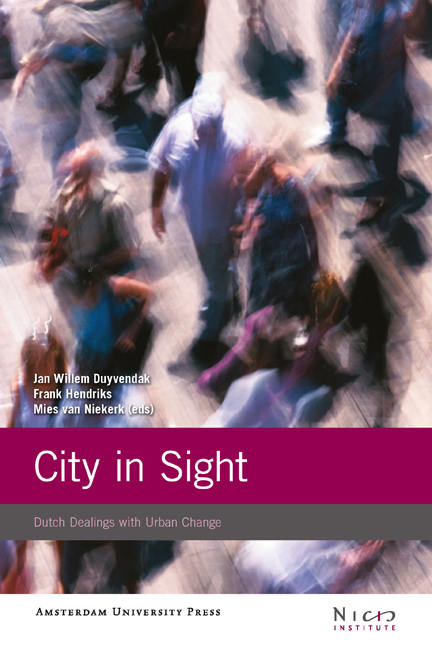Book contents
- Frontmatter
- Contents
- Acknowledgements
- Cities in Sight, Inside Cities: An Introduction 9
- Part I Urban Transformations and Local Settings
- Part II Urban Citizenship and Civic Life
- Part III Urban Governance and Professional Politics
- The Dutch Orange and the Big Apple: A Comparative Commentary
- References
- Notes on Contributors
- Index
Cities in Sight, Inside Cities: An Introduction 9
Published online by Cambridge University Press: 19 January 2021
- Frontmatter
- Contents
- Acknowledgements
- Cities in Sight, Inside Cities: An Introduction 9
- Part I Urban Transformations and Local Settings
- Part II Urban Citizenship and Civic Life
- Part III Urban Governance and Professional Politics
- The Dutch Orange and the Big Apple: A Comparative Commentary
- References
- Notes on Contributors
- Index
Summary
Dutch dealings with urban change
This book presents the results of the most recent research on urban topics in the Netherlands. Why would those results be of interest for a wider and also non-Dutch audience? We think for several reasons.
In the first place, the Netherlands’ struggle with many urban problems might be instructive for the urban problems other countries face as well (or will have to confront in the near future). Huge transformations that have manifested themselves in the Netherlands affect many more countries. The Dutch economy has become one of the most open (and in times of economic crisis: most vulnerable) and service-oriented of the world. Moreover, the Dutch population has changed dramatically: with one million Muslims and about one million other migrants (out of sixteen million inhabitants), the Netherlands has de facto become an immigration society, like many other West-European countries experiencing similar changes in the past decades. Compared to the old settler societies (the US, Canada, and Australia), the new immigrant countries struggle with problems they had not run into before. Especially for these ‘new’ immigration societies, the Dutch case might present relevant insights, pointers as well as warnings.
That brings us to the second reason why a book on Dutch urban topics is pertinent at this particular moment in history. The Dutch political and societal crisis – that became so visible in the two political murders of Pim Fortuyn (in 2002) and Theo van Gogh (in 2004) – are to a large extent perceived as urban crises: it is especially in the big cities of the country that the enormous changes in the economy and in social life express themselves the most. Just as in many other European countries, social problems of disadvantaged neighborhoods have become top priorities for policy makers at all levels: the district, the city, the region, the national and even the EU level. The time when (supra)national governance distanced itself from direct intervention in highly local, neighborhood-specific urban issues is clearly over: some national politicians visit the cities so often now that they come to resemble parttime community workers!
- Type
- Chapter
- Information
- City in SightDutch Dealings with Urban Change, pp. 9 - 22Publisher: Amsterdam University PressPrint publication year: 2009



